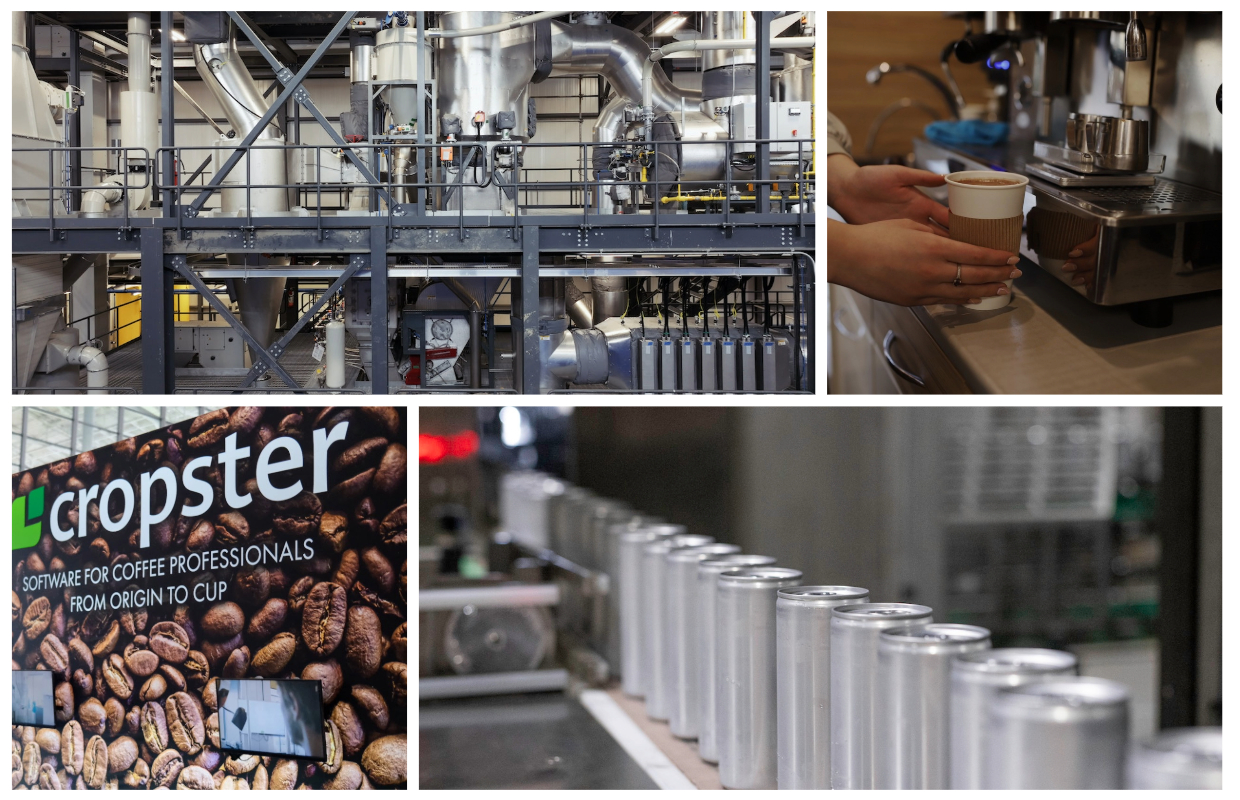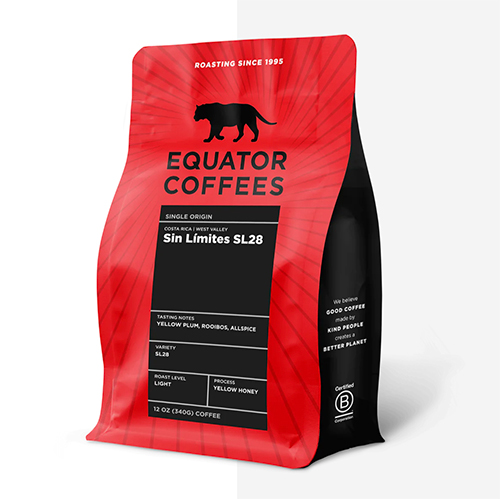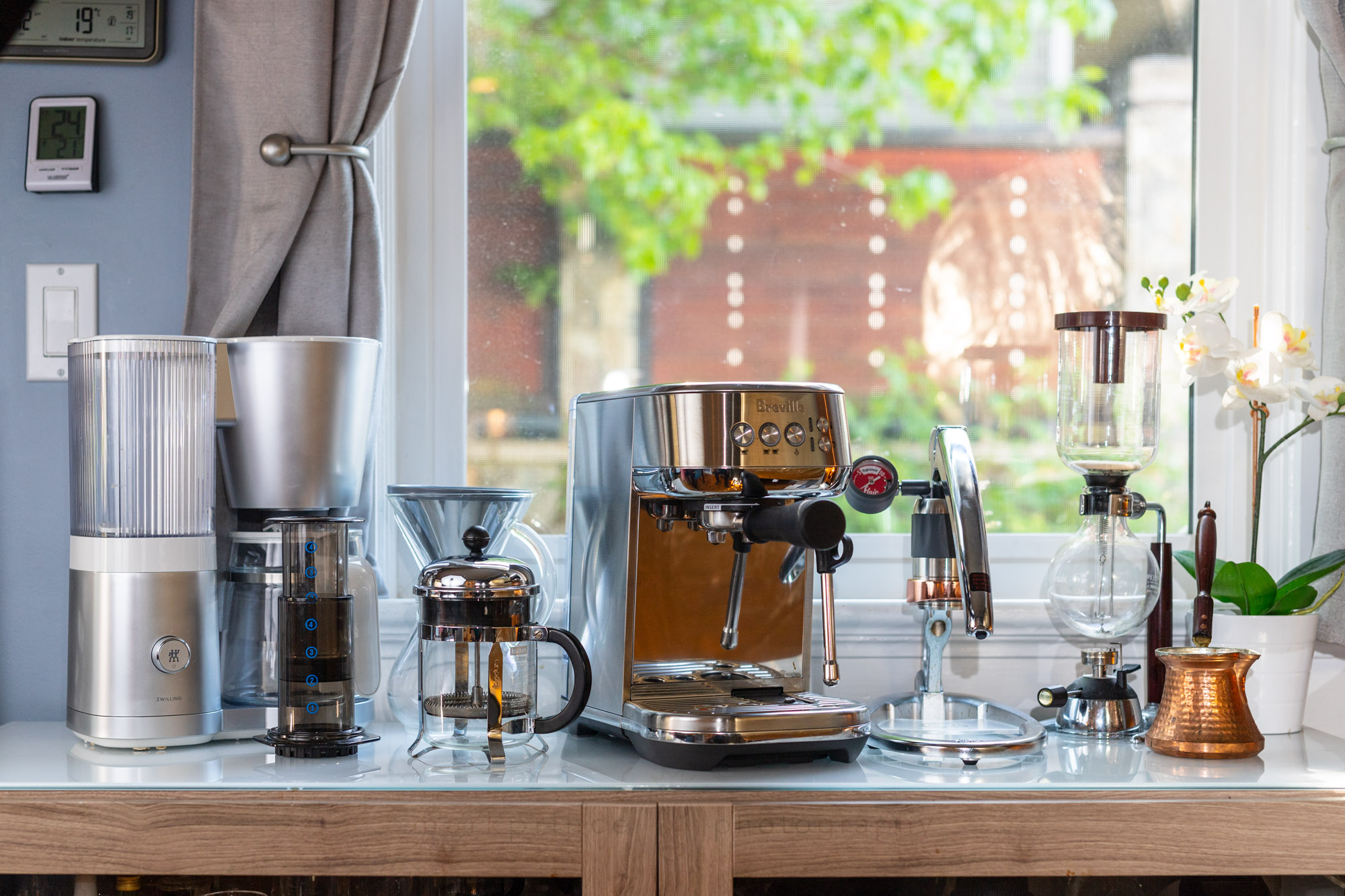

The ever-evolving world of specialty coffee continues to see rapid growth in the area of product differentiation, with a strong emphasis on processing innovation at the farm level. In the last decade or so, as the story of each individual coffee has become more important to the consumer, it is variation in processing method that seems to get the most attention.
Perhaps that’s because processing method, even more than tree variety, has the capacity to decisively alter cup profile, allowing farmers to direct outcomes and make their coffees stand out in a range of sensory directions. Experimenting with processing method also carries less long-term risk for farmers than planting new tree varieties.
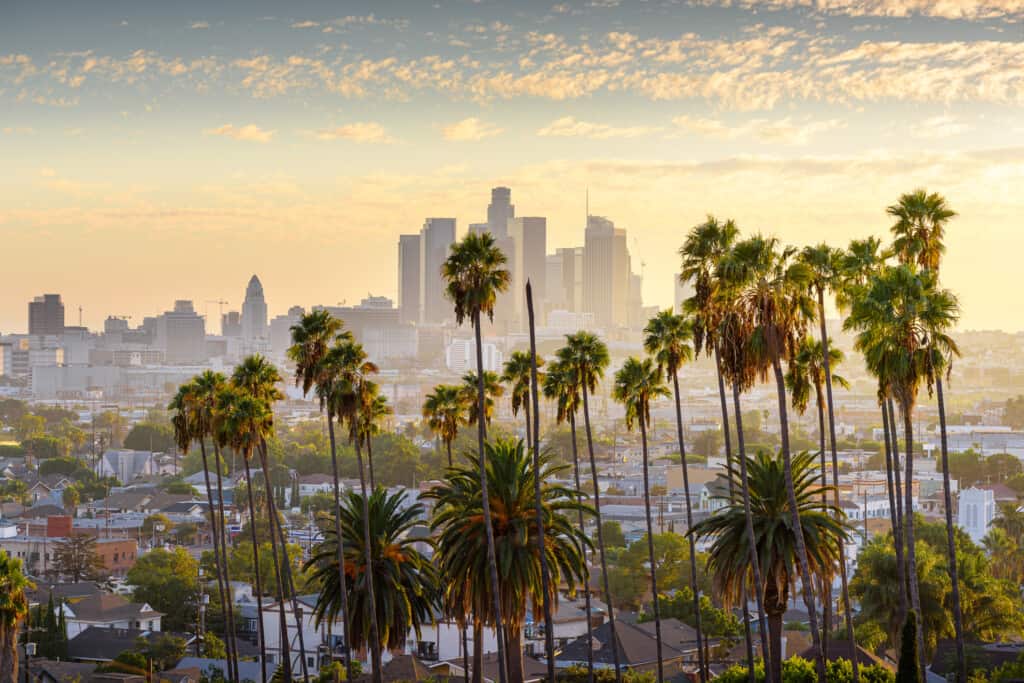
Sunset view of downtown Los Angeles, broadly the home of Regent Coffee, Espresso Republic, and The Reverse Orangutan.
This month, we focus on the contribution that roasters from Southern California are making in what is a particularly innovating and exciting time in coffee. However, coffees from the eight roasters featured here are not wild, envelope-pushing products of anaerobic fermentation or the outcome of other experimental methods such as adding fruit, wine yeasts, or lactic acid to fermentations — practices that are currently trending throughout the high end of specialty coffee. Instead, they are rather pristine traditional washed-process coffees or coffees meticulously prepared using the now classic natural or honey methods. Nevertheless, all focus on processing in their narratives — though more on the quality and nuances of processing than on novelty or difference. As you read the reviews associated with this report, you’ll understand why — each coffee is exemplary in its processing category, and each coffee’s story speaks to the care around processing at the farm level.
Classic Washed-Process Coffees Are Still Relevant
While farmers and specialty coffee roasters across the globe are busy figuring out their relationship to processing experimentation (how funky is too funky? How much manipulation is desirable? Are anaerobics a passing fancy?), classic washed coffees still have a place in consumer’s hearts, so even cafés serving molecular coffee cocktails at $12 a pop haven’t abandoned them.
Three Southern California roasters whose washed Kenya, Ethiopia and Honduras we review this month are examples of the highest-quality washed processing, evidenced not only by roaster and farmer narratives but also by the coffees’ presentation in the cup, which impressively foregrounds the classic character respectively associated with each of these origins.
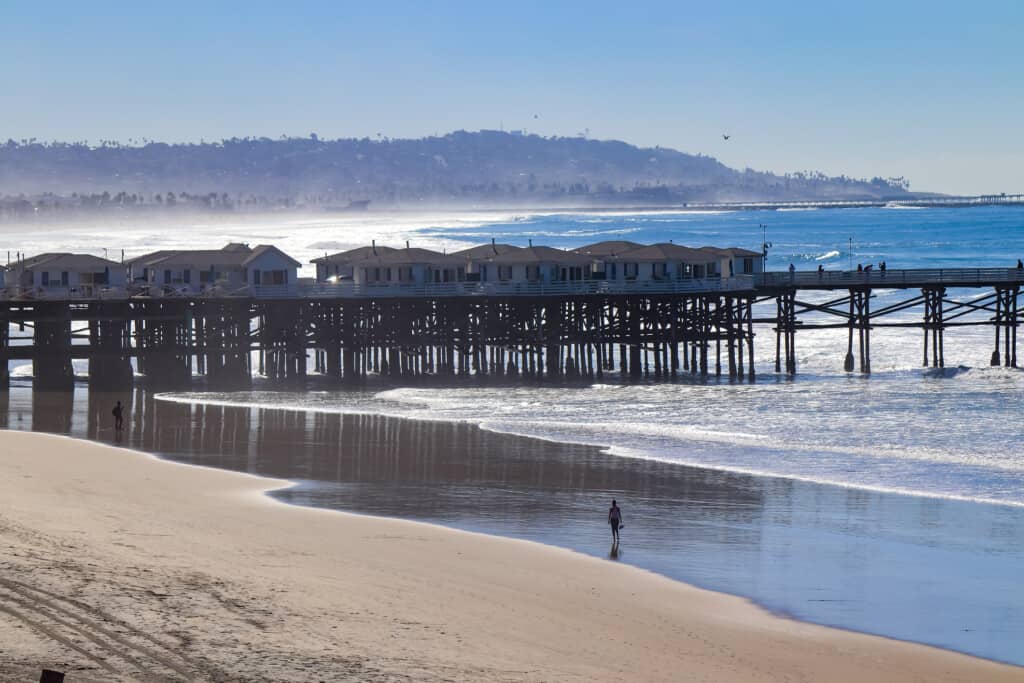
Crystal Pier at Pacific Beach in greater San Diego, California, home of Jaunt Coffee, Nostalgia Coffee Roasters, and Bird Rock Coffee Roasters.
Jimmy Silva, of San Diego’s Jaunt Coffee, says, “The SoCal coffee scene is focused on quality coffee, food offerings and the shop environment. Our role in our community is to provide exceptional coffee, create relationships with schools, organizations, and neighborhoods that surround us, and have offerings that appeal to our diverse district. The San Diego coffee community is eclectic in the sense that, depending on where you go, you will find cafés that represent their local communities and cultures quite well.”
When we blind-cupped Jaunt Coffee’s Kenya Nyeri Gathaithi (93), we knew it was a Kenya based on aroma alone. Telltale black currant notes — alongside wisteria, lime zest, tamarind and cedar — peg this coffee as a Kenya. It is wet-processed using the traditional Kenya “double-washed” method, meaning that after fermentation and washing the beans are soaked a second time in fresh water, promoting the clarity associated with the finest Kenya coffees.
Silva says that Jaunt’s plans include expanding its café space and creating a dedicated area for just roasting. He adds, “We’ve managed to stay relevant by focusing on the quality and value of our offerings, centering our attention on community support, social media (marketing), and, of course, our staff. Without our strong and supportive staff, there’s no way we could continue to move forward.”
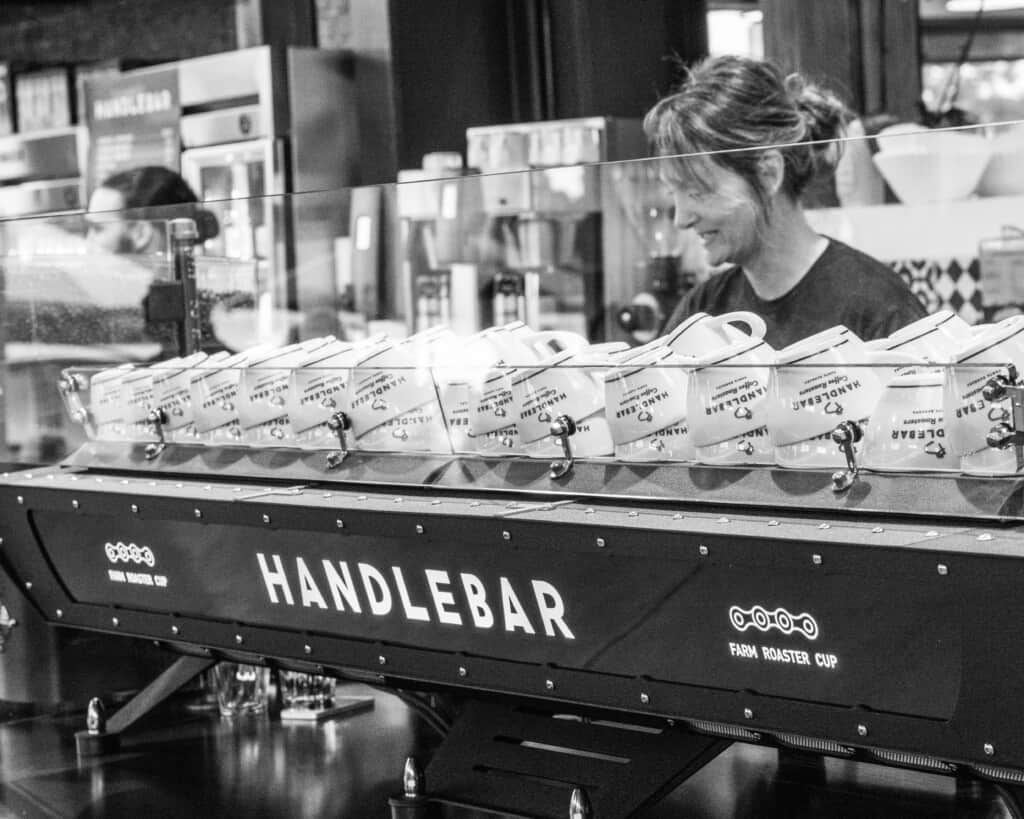
Kim Anderson, co-owner of Handlebar Coffee, behind the bar in Santa Barbara. Courtesy of Handlebar.
One of two roasters reviewed this month that are completely new to us is Handlebar Coffee in Santa Barbara. Founded in 2011 by a Kim Anderson and Aaron Olsen, who met on the professional cycling circuit, Handlebar is a hub in the burgeoning culinary scene in Santa Barbara. The name of the micro-roastery is a nod to their shared love of biking.
Handlebar’s Honduras Marcala (93) is richly nutty with an inviting butterscotch undercurrent and a balanced, bittersweet structure that gives it complexity and gravitas. Head roaster Geoffrey Leech says, “This particular coffee from Honduras came across our table almost three years ago. We were initially looking for an espresso component, and after cupping the Marcala, we were wonderfully surprised that not only did it have the quality that we wanted to add to our espresso blend, but it was so enjoyable that we decided to offer it as a standalone offering on the shelves. We’ve carried the Honduras ever since and has become a staple in our cafés. The coffee is well balanced, offering a little bit of acidity and brightness but not so much to deter the everyday consumer.”
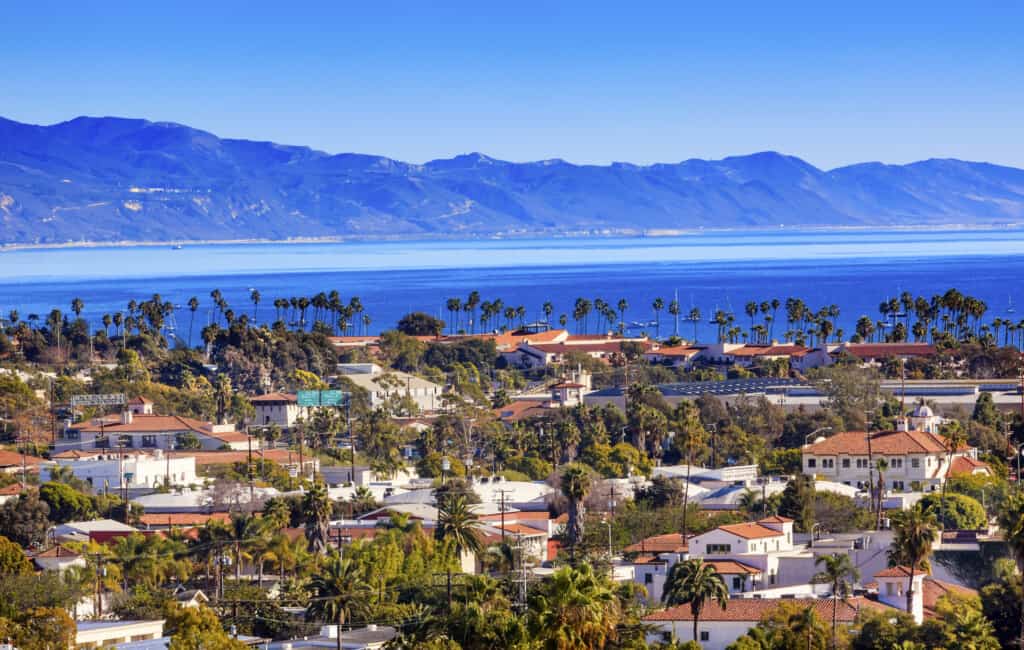
Aerial view of Pacific coastline overlooking Santa Barbara, California, home of Handlebar Coffee and up the road from Moore Coffee & Tea.
How is Handlebar looking ahead after the rough pandemic years? Leech says, “Like so many businesses, we are working our way back to pre-2020 normalcy, getting our food program up and running again with the hopes that we can again provide the full possibilities to the local community.”
Bird Rock Coffee’s Ethiopia Raro Boda (94) is the epitome of a classic washed Ethiopia with its citrusy-sweet, richly cocoa-toned and floral cup profile. Bird Rock’s business model has long focused on developing durable relationships with growers, and this is the third year running that the roaster has carried this coffee. It was processed using the traditional Ethiopia washed method: The freshly pulped coffee is fermented under water for 24-48 hours, washed, then soaked in fresh water for approximately two hours. After soaking the coffee is dried on raised beds for approximately 10-14 days. Co-owner and roaster Maritza Suarez-Taylor says this processing method promotes a cup with floral, tropical, and citric aromas.
Co-owner Jeff Taylor adds, “The SoCal coffee scene, much like the rest of the U.S., has really grown in the past 10 years. Our focus, since the beginning of Bird Rock Coffee in 2002 (and first café in 2006), is on quality, unique varieties and overall amazing coffee. We have many direct relationships with producers that we’ve maintained for 13-plus years. That communication and friendship/partnership allows us to discover great coffees consistently and focus on what’s new and exciting at the farm level. We aren’t a company that chases cupping tables for quality; we focus on development and maintenance with the producers we work with annually. Our producers trust us to represent them with great roasting technique and quality in the cup.”
Five Coffees on the Natural-Honey Fruit Continuum
The remaining coffees we reviewed for this report were all processed by either the natural or the honey methods, variations on the theme of intensifying a green coffee’s impulses toward the expression of fruit in the cup. The natural process simply means that the coffee cherries are dried in the whole fruit (rather than stripping the fruit off the bean before washing), and this ancient, now-classic processing method allows for development of a wide range of fruit notes in the aroma and on the palate. Honey processes, pioneered in Brazil but refined and popularized in Costa Rica, remove the skin but leave varying degrees of fruit flesh on the bean, partly in an effort to modulate the intensity and character of fruit notes in the final product. Both natural and honey processes are now ubiquitous throughout the coffee-producing world, and the number of coffees on the natural-honey spectrum we get for review in the Coffee Review lab each year outnumber the washed-process coffees. So, we feel confident in categorizing these two processes as classic at this point in specialty coffee’s evolution.
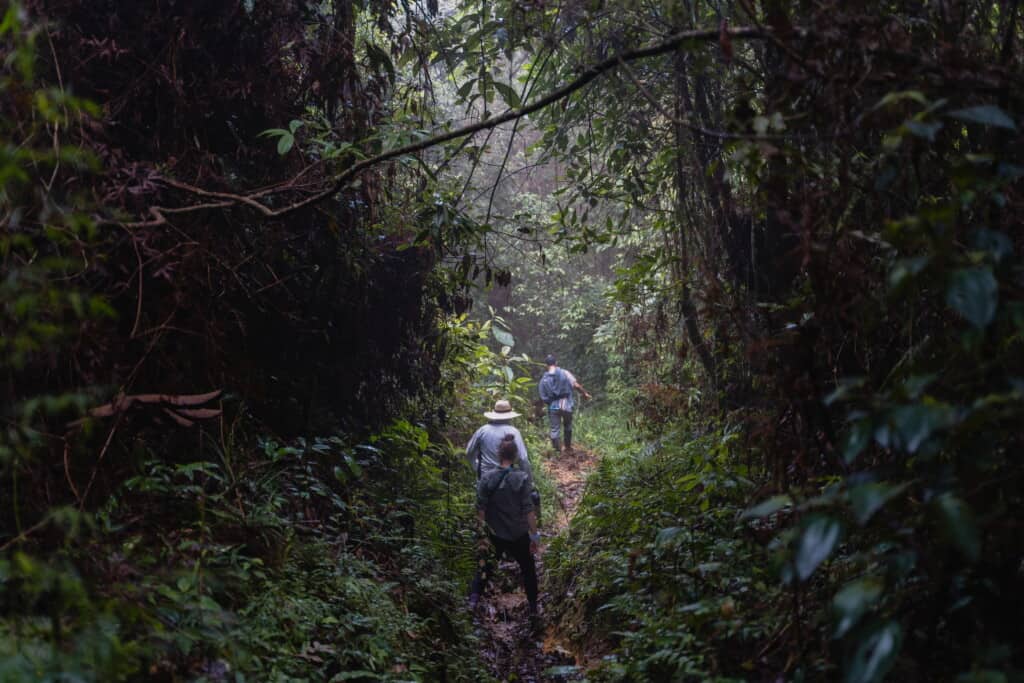
Taylor Fields of Nostalgia Coffee Roasters and Felipe Trujillo, owner of La Ventolera Farm, walking to his farm in Colombia. Courtesy of Edgar Ontiveros, Nostalgia Coffee Roasters.
Two natural-processed coffees rose to the top scores in this month’s cupping — Moore Coffee & Tea’s El Salvador Aida Batlle La Florida Natural and Nostalgia Coffee Roasters’ Colombia Geisha Cordillera Natural, both of which landed at 95 for their clean but intensely fruit- and floral-driven profiles.
Owner and roaster Gayla Moore, of Ventura-based Moore Coffee & Tea, echoes the idea that successful SoCal roasters aim to excel in both food and beverage, and that coffee continues to be a central part of that story. She says about the El Salvador La Florida reviewed here, “I have followed Aida Batlle for some time, and I make it a priority to search out women producers. Batlle’s [use of the natural] processing method results in a taste profile that matches both my palate and the roasting style I’ve developed over the years, which is balanced and lingering.” The La Florida natural is a richly floral- and fruit-toned coffee with tropical notes of passion fruit and star jasmine.
Moore continues to promote the work of women on both the producer and retailer sides of the business. She says, “It’s heartening to know my coffee is well-represented in my community, as well as being appreciated by customers across the country. I’ve been able to stay relevant because, first and foremost, I offer top-quality coffee. I also watch the market for taste and economic trends and am able to adapt to changes while staying true to my commitment to excellent product and customer service.”
Taylor Fields, owner of Nostalgia Coffee Roasters, has nothing but praise for Felipe Trujillo’s Colombia Geisha Cordillera, which also earned a score of 95. This natural-processed Geisha is deeply chocolaty and spice toned with throughlines of dried blueberry and magnolia.
Fields, who just returned from visiting Trujillo at his farm, says, “What attracts us to any particular coffee is also what our customers love about it. Every single coffee we offer has to be approachable, unique, direct trade, and improve the lives of those who work with it. This Colombia Geisha hits all of those points times 10!”
She adds, “This Geisha is also unique because of our direct trade relationship and story behind the coffee. Felipe is truly helping to shape the next generation of specialty coffee producers in Colombia. In partnership with [exporter] Unblended Coffee, he is taking a tremendous role in mentoring young producers and creating pathways for them to enter the specialty market in the United States. We were able to visit with both Unblended Coffee and Felipe at the end of June, participate in a forum and work directly with the young producers on how to enter the market and take the leap into investing in quality over quantity. Felipe is an inspiration to so many, and this Geisha embodies all of his hard work.”
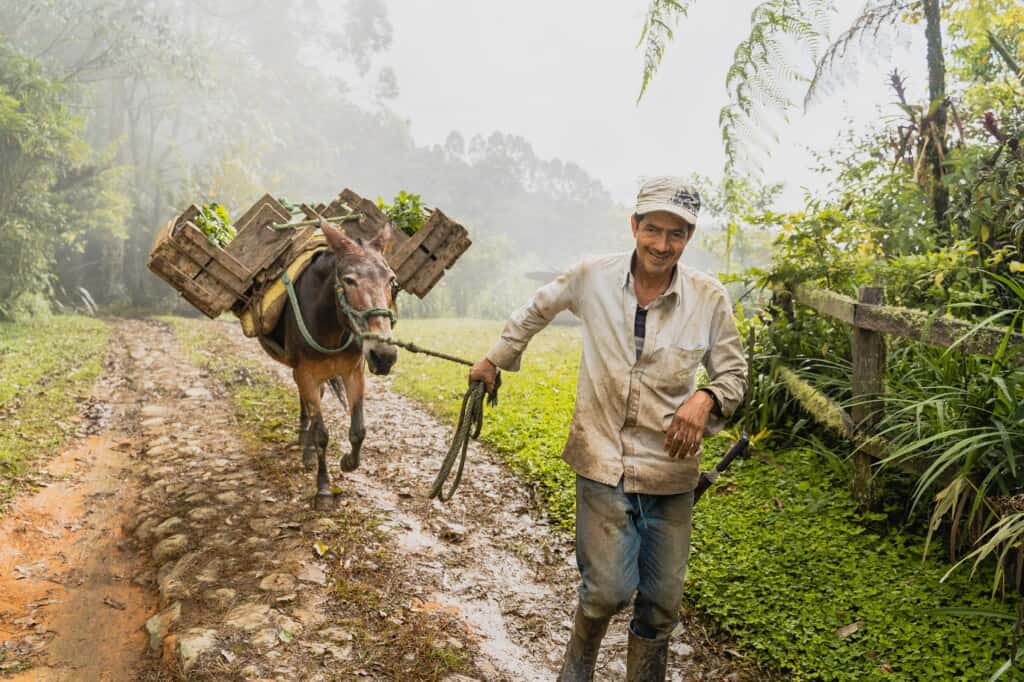
Preparing to replant coffee trees at Felipe Trujillo’s La Ventolera Farm. Courtesy of Edgar Ontiveros, Nostalgia Coffee Roasters.
Sadly, although this was Trujillo’s first harvest of this Geisha, it will also be his last for the next few years, as all of these Geisha trees died due to severe rain and cold.
When we asked Fields about her roastery’s SoCal ethos, she replied: “I originally fell in love with coffee while in Chicago, as those cafés offered a respite from the bitter cold winters and welcomed all types of coffee lovers. At Nostalgia, our vibe, values, and approachable roast profiles aim to evoke that sense of hospitality, embrace, and friendly nature while sharing the sunny SoCal warmth with as many people as possible. At the end of the day, Nostalgia is a fusion of Midwest hospitality with the idyllic Southern California lifestyle.”
Two honeys and another natural round out our top-scoring coffees, all scoring 93.
Chino-based Espresso Republic’s Ethiopia Gigesa Natural (93) is fruit-toned and sweetly herbaceous with notes of Bing cherry, marjoram, honeysuckle, salted caramel, and fresh-cut oak. The roaster didn’t answer our request for comment by publication time, but the coffee is worth seeking out among offerings by Southern California roasters. It’s a sun-dried coffee in the classic Ethiopia fruit-and-herb style.
Leon Nie, founder of Regent Coffee in Glendale, loves Costa Rica’s Hacienda Sonora (93) so much that this lot, produced from the locally developed Villa Sarchi variety, is the third coffee he’s carried from this farm. Leon, who came to the U.S. from China in search of better opportunities for his family, now operates a successful roastery in his adopted home. He says of the Southern California coffee scene, “I think SoCal specialty coffee is in a very fast developing period. My wife, Di Yao, and daughter and I moved to the U.S. in 2015, and then, it wasn’t easy to find a decent specialty coffee shop. I’m so lucky and honored to be among the growing number now.” He still considers himself a student of coffee and hopes to grow organically with a focus on high-quality coffees and cold brew. The Costa Rica Villa Sarchi honey is juicy, balanced, and cleanly fruit-forward.

Jamil Radney (left) and Geoff Clark, co-owners of The Reverse Orangutan, in a self-described “fun kinda ‘we’re gonna drop the hardest mixtape’ shot.” Courtesy of The Reverse Orangutan.
Another roaster discovery for us here at Coffee Review is The Reverse Orangutan, a Glendora-based roaster whose Ethiopia Shantawane Buncho Honey (93) we enjoyed for its vibrantly sweet-tart profile supported by sweet herb and cocoa notes.
Jamil Radney, co-owner, roaster and lead barista, says, “The specialty coffee scene here is experiencing a beautiful new stride as coffee shops continue to push the limits on delicious coffee. There are so many new players in the industry with so many different approaches to sourcing, roasting and philosophy, it’s wonderful. Our role is to deliver serious gourmet shit with an approachable demeanor. We think coffee should be good, easy to comprehend, and something you’re excited to enjoy. Our guests love that we aren’t afraid to bring in fun experimental lots, and they get excited about new and emerging flavors coming from these talented farmers and mills.”
Radney and Geoff Clark, co-owner and director of green purchasing, who together founded The Reverse Orangutan in 2018, have 20 combined years of experience in the specialty coffee industry working for various cafés in the Southern California region. Radney says, “We cut our teeth as baristas in the burgeoning third-wave scene, where latte art and pour-overs became the norm. During our tenure as baristas, we saw the industry becoming too exclusive, and we believe we can make a change in that regard. We believe coffee should be approachable, casual, and seriously gourmet. Our company’s name is an homage to a chess game that happened in the 1920s. One of the players consulted an orangutan about what their first move should be, and the chess opening has since been called ‘the orangutan offensive.’ Our business philosophy is that the world has made its first move, so we’re playing our counter-offensive, The Reverse Orangutan. Our name is our guiding principle in how we approach the coffee game.”
It was clear in talking with these roasters, both the experienced and the newcomers, that in addition to a laser focus on quality and obsession with meticulous processing, another SoCal theme emerged regarding the need for accessibility and consumer-friendliness. We wholeheartedly second this aspiration, as quality and access are not — should not be — mutually exclusive (as is often the case with wine).
We were barely able to touch on the expansive range of specialty roasters and coffees in Southern California this month, but even with this small selection of classic washed, natural, and honey-processed coffees, it’s clear that the region is upping the specialty coffee ante for us all.




